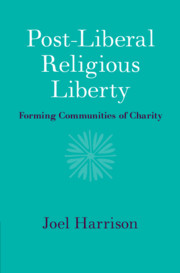Book contents
- Post-Liberal Religious Liberty
- Post-Liberal Religious Liberty
- Copyright page
- Dedication
- Epigraph
- Contents
- Acknowledgements
- Table of Cases
- 1 Introduction
- 2 The Liberal Egalitarian Account
- 3 Secularisation Challenged
- 4 Modern (Christian) Responses
- 5 The Ecclesiological Account
- 6 Pluralism and Disagreement
- 7 Conclusion
- Select Bibliography
- Index
7 - Conclusion
Published online by Cambridge University Press: 06 July 2020
- Post-Liberal Religious Liberty
- Post-Liberal Religious Liberty
- Copyright page
- Dedication
- Epigraph
- Contents
- Acknowledgements
- Table of Cases
- 1 Introduction
- 2 The Liberal Egalitarian Account
- 3 Secularisation Challenged
- 4 Modern (Christian) Responses
- 5 The Ecclesiological Account
- 6 Pluralism and Disagreement
- 7 Conclusion
- Select Bibliography
- Index
Summary
I have presented two competing accounts of religious liberty. The liberal egalitarian account understands religious liberty as signifying respect for conscience, identity, or authenticity. Religious liberty consequently is not limited to particular traditions of religious belief and practice, but concerns the broader value of personal autonomy or the individual’s capacity for self-definition. This value is supported by a ‘neutral’ state – one that furthers and manages individual claim-rights, potentially against the attempts of traditional religious groups to bind individuals or else shape the ends of civil authority. In contrast, the ecclesiological account is focused on persons in relationship or forming communities of solidarity, fraternity, and charity, oriented to God and neighbour. The liberty of such communities is grounded on this quest for a good end. This does not deny the importance of individual persons. There remains a Romantic sense of the person’s creativity that secures the person’s fundamental value. Rather than being a fungible instance of an individual pursuing a conception of the good, he or she is a unique gift, exercising talents for a common life or changing the network of relations around him or her. Nor does this account ignore pluralism; rather, it casts plural traditions as further contributions to a shared quest. They are not simply vehicles for individual interests but rather are recognised as differently pursuing shared goods integral to our common life. On this account, civil authority is to support this religious quest. It is a complementary arm for pursuing human flourishing or right relationship. It is to respond to the exhortations of the Church, encourage the pursuit of charity at multiple levels of authority, support groups pursuing different goods – like education or welfare – that further this end, and be attentive to claims of conscience shaped by this quest.
- Type
- Chapter
- Information
- Post-Liberal Religious LibertyForming Communities of Charity, pp. 225 - 241Publisher: Cambridge University PressPrint publication year: 2020

